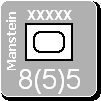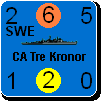Shannon V. OKeets
Posts: 22095
Joined: 5/19/2005
From: Honolulu, Hawaii
Status: offline

|
quote:
ORIGINAL: hakon
The following topic has been discussed in both the playing groups I regularily play in:
When the US tries to declare war on Japan, they have to roll a die to see if the dow is successful.
The question is, Can the CW
i) wait with their DOW until after the US DOW has been confirmed,
ii) or must they declare war at the same time that the US declares that they will TRY to declare war.
------
The argument for position (ii) relies on a statement in the beginning of the RAW ruleset, stating that "the rules are laid out in order of play", interpreting that sentence as a universal rule.
The supporters of position (i) claim that this is just informative, a kind of guide for the reader, and that the actual steps in the order of play is defined in the order of play chapter, while any requirements as to play order within a step is only limited by specific rules withing that step. (Eg, the DOW section clearly states that DOW on minors come after DOW on majors.)
Generally, I support the latter interpretation, both in the manner that I read the rules, as well as from a wifzen perspective.
From a gameplay perspective, I see two important reasons for letting the CW declare war after the US has agreed with itself on whether to declare war or not.
1) First of all, the US was already a non-belligerent ally of the CW already before they actually entered the war. There is simply no way that the US would declare on Japan without first warning the UK about the act. With interpretation (ii), Japan will usually get a surprise impulse against the CW, which will give them the opportunity to claim several important islands/ports. (NEI, etc). This seems wrong to me.
2) Second, from a balance and historical perspective, it should hurt a bit for Japan to not declare on the US. If they can just wait the US out, and still accomplish their most important objectives, there is really very little incentive for Japan to DOW the allies first. (Rabaul alone is way more important than getting to do a port strike vs Pearl Harbor.)
Having just reread the rule, the point of dispute seems to lie in interpreting "All major powers on this side announce which major powers on the other side they are declaring war on this impulse." Specifically whether "declaring war" means: (1) the US player announcing he is going to try to declare war on Japan, or (2) the US player announcing the same and then rolling for his declaration of war on Japan. If the interpretation is #1, then the Commonwealth has to decide whether to declare war on Japan concurrently before seeing the die roll outcome of the US attempt. If the interpretation is #2, the Commonwealth player gains the benefit of the extra intelligence.
There is another major effect derived from how this is interpreted. If #1 is followed, then there could be US Entry effects of the Commonwealth declaring war on Japan, which, in turn, could affect whether the US player succeeds in his declaration of war attempt.
I would have to read the code in MWIF to see how Chris implemented this in CWIF.
My personal take is for #1, which has the effect of inhibiting the Commonwealth from declaring war on Japan until the impulse after the US has succeeded.
And yes, that gives Japan a 'free' surprise attack impulse on the Commonwealth. I see the Commonwealth being very careful about US public opinion up to the point that the US declares war. Even to the point of risking the loss of territory and combat casualities.
_____________________________
Steve
Perfection is an elusive goal.
|
 Printable Version
Printable Version












 New Messages
New Messages No New Messages
No New Messages Hot Topic w/ New Messages
Hot Topic w/ New Messages Hot Topic w/o New Messages
Hot Topic w/o New Messages Locked w/ New Messages
Locked w/ New Messages Locked w/o New Messages
Locked w/o New Messages Post New Thread
Post New Thread